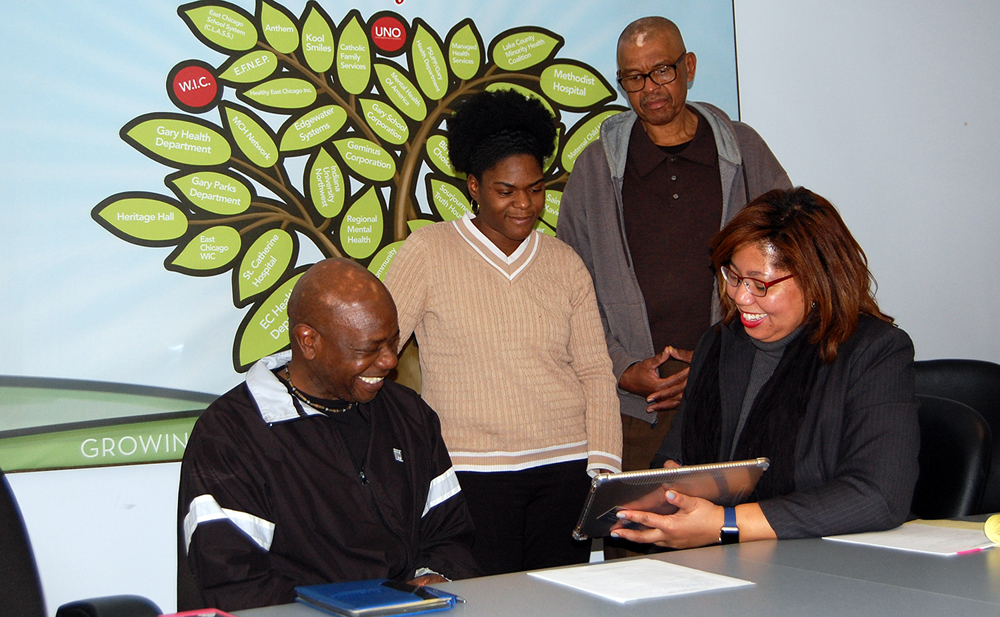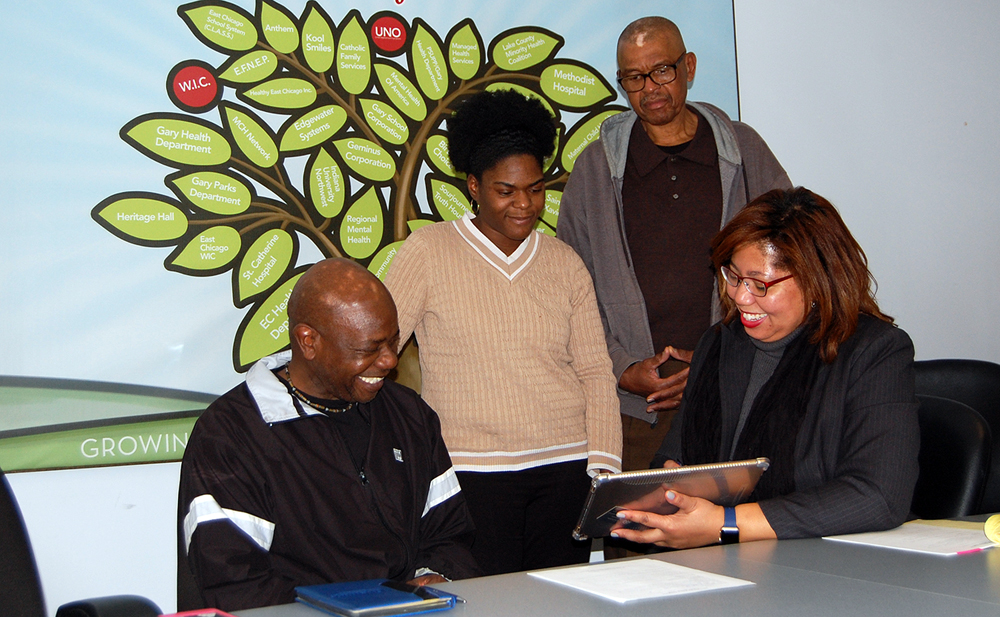
Seated l-r, GCSSBM volunteer Gregory Henry and Atty. Carla Morgan; standing, Alicia Muhammad and GCSSBM executive director Bennie Muhammad
Expungement free for some 14 to 24-year-olds
Contributed By:The 411 News
Indiana's second chance laws block background checks from revealing some arrests and conviction histories
Bennie Muhammad believes in second chances and now he’s in a position to give those chances to others who need it the most, especially teens and young adults with criminal records who live in East Chicago and Gary.
For ex-offenders, background checks can determine if they will be hired or fired, and whether they get access to housing and education. A criminal record can also affect a person’s right to vote, hold public office, or own or possess a firearm.
During the Mike Pence administration, Indiana redefined the laws that limited public access to criminal histories. Called “second chance laws,” Indiana expanded the sealing and expungement of criminal records from misdemeanors to include some felonies. That meant background checks wouldn’t show arrests and conviction histories.
And during that time, Mohammad, as executive director of the Gary Commission on the Social Status of Black Males (GCSSBM), hosted town hall meetings and forums across Lake County to inform the public about the state’s new laws. At Commission sponsored workshops, lawyers met one-on-one with ex-offenders to explain their new rights and the steps in the legal process to block access to their criminal histories.
The Commission studies and works to reduce the problems that black males face in the areas of criminal justice, education, employment, and health.
“Previously, we were just educating the community on the new legislation. Today, we know the obstacle for many ex-offenders is they don’t have jobs and cannot afford to pay lawyers,” Muhammad explained at the Commission’s legal clinic held last week in Gary. “Now, we have the funding.”
Through a partnership with the public housing authorities in East Chicago and Gary, a free legal clinic now operates in those cities funded by the U.S. Dept. of Justice and the Dept. of Housing and Urban Development. The clinic offers free expungement services for teens and young adults through the two agencies’ Juvenile Re-entry Assistance Program.
To qualify for the free services, persons must be Gary or East Chicago residents between the ages 14 and 24.
They have to have a connection to public housing, HUD’s Section 8 or Housing Choice vouchers. Eligibility extends to those who currently use those housing programs and also, if they once lived in Gary or East Chicago Public Housing, used section 8, or currently could or would live in public housing or section 8 except for their criminal conviction.
Along with expunging and sealing of criminal records, the clinic helps with child support issues and can help restore driving privileges.
Atty. Carla Morgan is the clinic’s lawyer. The attorney files the legal petition for expungement in the courts that had jurisdiction over the offenses. Approvals must be gained from the prosecutors and judges in the cases. Morgan said the clinic can help expunge arrest records that did not result in a conviction.
Alicia Muhammad came to the clinic looking for information about getting a misdemeanor conviction expunged. At age 25, Atty. Morgan said Alicia didn’t qualify for the program but would advise her on steps to take.
The legal clinics are held twice a week in East Chicago. Office hours are 10 a.m. to 12 p.m. on Tuesdays and Thursdays or by appointment at the North Township Trustee Office, 2100 Broadway.
In Gary, the clinic is held at the GCSSBM office, 839 Broadway, Tuesdays, from 5 to 7 p.m. or by appointment.
Limiting public access to some criminal histories can help many ex-offenders return to their communities. A main objective of Indiana’s second chance laws is to reduce the chances ex-offenders will be re-incarcerated. “It just makes practical sense to me that when somebody has served their court-imposed sentence there has to be a pathway back into society for them. Without this, we can’t expect them to become productive members of society,” said Rep. Jud McMillin, author of Indiana’s revised expungement laws.
Violent crimes, sexual and major drug offenses are not eligible for expungement.
For questions or to make an appointment, call (219) 390-8981 or 397-9974 ext 11.

Seated l-r, GCSSBM volunteer Gregory Henry and Atty. Carla Morgan; Standing, Alicia Muhammad and GCSSBM executive director Bennie Muhammad
Story Posted:12/10/2017
|